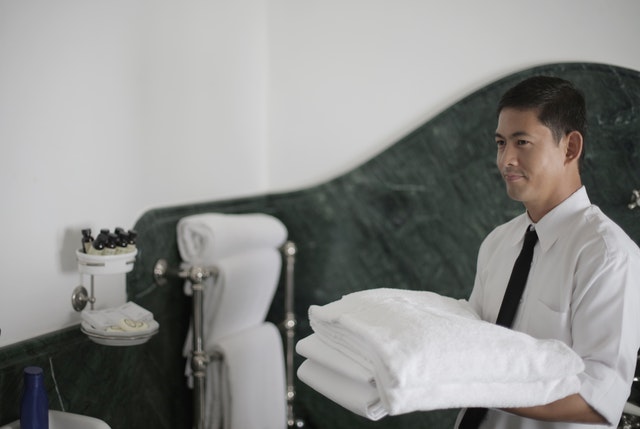You will probably have heard of the term. But do you really know what the meaning is of domestic staff? Some people think it is something of the past, from a Downton Abbey area. However, it is very much a thing of the present, and a big industry! So whether you are looking for work as domestic staff. Or if you are looking to hire domestic staff. Let’s have a real good look at the meaning of it, and what it could mean for you.
Domestic Staff – The Meaning Of the Word
To get the meaning of domestic staff clear straight away: domestic staff are people who work in a private household or private residence.
This can be directly working for a family in their house. Here you can think of a nanny, for example. Or a housekeeper. But it can also be people who work for a family, not directly in their house. Chauffeurs, gardeners and security can fall under this bracket.
Domestic Staff is not something of the UK only. Many people all over the world have people working for their household or family. Or they work for a family directly. Some research suggests that in total, there could be over 100 million people working as domestic staff in the world!
History & Legal Rights
Domestic staff have been around for many, many years. Unfortunately, throughout history, there have been many cases of domestic staff being mistreated. And considered ‘lower’ than their employers. In some cultures and countries, domestic staff would be seen as servants, with very little to no legal employment or worker rights. Traditionally, many people working as domestic staff used to be female, and lots of them were likely to be immigrants too.
For many years, domestic workers have fought for their rights to be acknowledged as equal to any other person being employed or working a job. In some countries, inequality unfortunately still exists.
Luckily, many countries are improving – or having improved – legal rights for domestic workers. The reputation around domestic staff has and is continuing to change to with the support of new laws countries have adapted.
In the United Kingdom, for example, a very first legal framework regarding domestic staff was called the ‘Master and Servant Act‘ from 1823. This was the first step in a long battle for equal rights for domestic staff. And even though the British act inspired many other countries to adopt similar rulings. For a long time, however, the law was very much in favour of the employer.
Current Situation
Although there are still countries that do not have equal rights for domestic staff in comparison to other workers, the UK has made big steps forwards since their first legal documents in the early 19th century. Nowadays, there are very clear rules on what you must and mustn’t do as an employer of domestic staff in the UK. The rights of domestic staff are also very clearly set. It has made the domestic staff industry a much more positive, and thriving industry that has made people proud of being a part of.
Common Misconceptions
- Even though someone might be living in your home, it does not mean they can work all hours of the day or week. They are (in the UK!) legally allowed at least a 20-minute uninterrupted work break if they work more than 6 hours. And they also have the right of an uninterrupted 24 hours without any work each week or an uninterrupted 48 hours without any work each fortnight.
- Even if you give your domestic staff an extensive package with a car, food and accommodation – you will still need to pay them the minimum legally set salary. It is correct that in the UK if accommodation is offered, this can be taken into account when calculating what the person’ minimum wage should be. However, there is not a big difference. So as an employer you should not think you can pay someone a low salary, just because you are offering accommodation.
- It often happens that some domestic staff (nannies, for example) will be asked to accompany the family on holiday. The family may pay for the person’s travel and accommodation – however, they should still be paid a salary for their work. Even though they might be travelling on holiday with you, they are working, and not having time off. So this is something to take into account if you are planning a holiday with your nanny, for example.
How Can Polo & Tweed Help
Would you like to find out more about what it might be like to work in a domestic household? A first great step would be to look at training options, Training is a great way to learn more about the industry. And to find out if the career might be one suited for you and your skills. At Polo & Tweed we are proud to present domestic staff training options for in-person, online, group and private setups. Only the best professionals in the industry have teamed up with Polo & Tweed to create the best and most extensive training options in the industry. There is a training course for any subject and budget. You can contact us now to find out more about all the training options.
Or perhaps you are looking to hire a new member of staff for your household? We would be delighted to help! Polo & Tweed has thousands of vetting, checked and highly experienced candidates registered and looking for a new challenge. From Housekeepers, Chauffeurs and Gardeners to Butlers to Nannies. And many more! You can get in touch with us now to find out how we can help.

